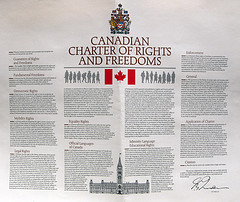The Power of the Written Word

According to the Merriam-Webster’s Dictionary, the definition of text is: “the original words and form of a written or printed work (2) an edited or emended copy of an original work”( http://www.merriam-webster.com/dictionary/text).
Text is made up of Words. Words=Freedom. Freedom=Power.
I chose the picture of the Canadian Charter of Rights to indicate the power of text. Text can record history, put laws into effect, allow us freedoms that are documented for the next generation, and enables the recording of the passage of time. Text can describe in such a way as to ignite our imaginations and incite our passions. Putting on to paper the visions and aspirations that only lie in our minds is an amazing innovation.


3 comments
1 Erin Gillespie { 09.14.09 at 6:45 am }
Words do equal freedom which is power. This is a very clear link between text and social consequence. Interestingly, I lived in Japan for 10 years and never mastered reading and writing in kanji. I explained to my friends how frustrated I felt. I think the word I was looking for was, indeed, “powerless”. Erin
2 Catherine Gagnon { 09.14.09 at 11:17 am }
The fact that you mention that these Rights and Freedoms are documented for future generations brings to mind something I read in Ong about orality and oral history. He explains how the orator would colour his account of historical facts to suit the audience. If a family was out of favour, for instance, that family geneology would be omitted and might be forgotten over time. Now imagine if we did that with our Rights and Freedoms. I can see the necessity of a medium that would leave little to interpretation. Mind you, is that not exactly what the Supreme Court Justices do each time someone challenges the Constitution?
3 Catherine Gagnon { 09.14.09 at 12:43 pm }
Just as a reference to my previous post, you can find it in Ong, Walter J.. Orality & Literacy: The Technoligizing of the Word. London and New York: Routledge, 1995. p. 67.
You must log in to post a comment.